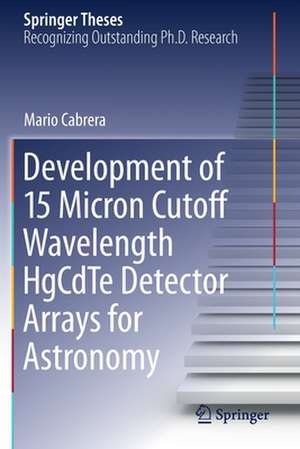Development of 15 Micron Cutoff Wavelength HgCdTe Detector Arrays for Astronomy: Springer Theses
Autor Mario Cabreraen Limba Engleză Paperback – 19 sep 2021
| Toate formatele și edițiile | Preț | Express |
|---|---|---|
| Paperback (1) | 632.70 lei 6-8 săpt. | |
| Springer International Publishing – 19 sep 2021 | 632.70 lei 6-8 săpt. | |
| Hardback (1) | 638.89 lei 6-8 săpt. | |
| Springer International Publishing – 18 sep 2020 | 638.89 lei 6-8 săpt. |
Din seria Springer Theses
- 18%
 Preț: 997.88 lei
Preț: 997.88 lei -
 Preț: 389.88 lei
Preț: 389.88 lei - 15%
 Preț: 646.94 lei
Preț: 646.94 lei - 18%
 Preț: 943.43 lei
Preț: 943.43 lei -
 Preț: 399.29 lei
Preț: 399.29 lei - 18%
 Preț: 944.99 lei
Preț: 944.99 lei - 15%
 Preț: 636.80 lei
Preț: 636.80 lei - 18%
 Preț: 941.05 lei
Preț: 941.05 lei - 15%
 Preț: 643.16 lei
Preț: 643.16 lei - 15%
 Preț: 642.68 lei
Preț: 642.68 lei - 18%
 Preț: 1103.62 lei
Preț: 1103.62 lei - 20%
 Preț: 558.82 lei
Preț: 558.82 lei - 18%
 Preț: 1112.30 lei
Preț: 1112.30 lei - 18%
 Preț: 944.19 lei
Preț: 944.19 lei - 18%
 Preț: 1109.92 lei
Preț: 1109.92 lei - 18%
 Preț: 1217.27 lei
Preț: 1217.27 lei - 15%
 Preț: 640.06 lei
Preț: 640.06 lei - 15%
 Preț: 636.45 lei
Preț: 636.45 lei - 15%
 Preț: 640.06 lei
Preț: 640.06 lei - 15%
 Preț: 640.88 lei
Preț: 640.88 lei -
 Preț: 389.70 lei
Preț: 389.70 lei - 20%
 Preț: 563.89 lei
Preț: 563.89 lei -
 Preț: 393.35 lei
Preț: 393.35 lei - 15%
 Preț: 637.93 lei
Preț: 637.93 lei - 15%
 Preț: 641.85 lei
Preț: 641.85 lei - 18%
 Preț: 1225.94 lei
Preț: 1225.94 lei - 20%
 Preț: 551.36 lei
Preț: 551.36 lei - 18%
 Preț: 1229.10 lei
Preț: 1229.10 lei - 15%
 Preț: 639.25 lei
Preț: 639.25 lei - 18%
 Preț: 999.45 lei
Preț: 999.45 lei - 15%
 Preț: 640.06 lei
Preț: 640.06 lei - 18%
 Preț: 1220.45 lei
Preț: 1220.45 lei - 18%
 Preț: 1116.26 lei
Preț: 1116.26 lei - 18%
 Preț: 1110.72 lei
Preț: 1110.72 lei - 18%
 Preț: 1000.87 lei
Preț: 1000.87 lei - 18%
 Preț: 891.17 lei
Preț: 891.17 lei - 15%
 Preț: 640.06 lei
Preț: 640.06 lei - 5%
 Preț: 1154.07 lei
Preț: 1154.07 lei - 15%
 Preț: 635.96 lei
Preț: 635.96 lei - 15%
 Preț: 640.88 lei
Preț: 640.88 lei -
 Preț: 387.20 lei
Preț: 387.20 lei - 18%
 Preț: 1109.92 lei
Preț: 1109.92 lei -
 Preț: 385.25 lei
Preț: 385.25 lei -
 Preț: 385.25 lei
Preț: 385.25 lei - 18%
 Preț: 1112.30 lei
Preț: 1112.30 lei - 18%
 Preț: 999.45 lei
Preț: 999.45 lei -
 Preț: 386.99 lei
Preț: 386.99 lei - 15%
 Preț: 637.13 lei
Preț: 637.13 lei - 20%
 Preț: 554.20 lei
Preț: 554.20 lei - 20%
 Preț: 555.57 lei
Preț: 555.57 lei
Preț: 632.70 lei
Preț vechi: 744.35 lei
-15% Nou
Puncte Express: 949
Preț estimativ în valută:
121.08€ • 125.08$ • 100.77£
121.08€ • 125.08$ • 100.77£
Carte tipărită la comandă
Livrare economică 25 martie-08 aprilie
Preluare comenzi: 021 569.72.76
Specificații
ISBN-13: 9783030542436
ISBN-10: 3030542432
Ilustrații: XVII, 121 p. 71 illus., 44 illus. in color.
Dimensiuni: 155 x 235 mm
Greutate: 0.2 kg
Ediția:1st ed. 2020
Editura: Springer International Publishing
Colecția Springer
Seria Springer Theses
Locul publicării:Cham, Switzerland
ISBN-10: 3030542432
Ilustrații: XVII, 121 p. 71 illus., 44 illus. in color.
Dimensiuni: 155 x 235 mm
Greutate: 0.2 kg
Ediția:1st ed. 2020
Editura: Springer International Publishing
Colecția Springer
Seria Springer Theses
Locul publicării:Cham, Switzerland
Cuprins
Chapter1: Introduction.- Chapter2: Test and Data Acquisition Setup.- Chapter3: Dark Current Theory.- Chapter4: Array Characterization.- Chapter5: Phase I Results: 13 m Cuto Wavelength Devices.- Chapter6: Phase II Results: 15 m Cuto Wavelength Devices.- Chapter7: Conclusions and Future Work.
Notă biografică
Mario Cabrera received his PhD from the University of Rochester in 2020.
Textul de pe ultima copertă
This thesis describes advances in the understanding of HgCdTe detectors. While long wave (15 μm) infrared detectors HgCdTe detectors have been developed for military use under high background irradiance, these arrays had not previously been developed for astronomical use where the background irradiance is a billion times smaller. The main pitfall in developing such arrays for astronomy is the pixel dark current which plagues long wave HgCdTe. The author details work on the success of shorter wavelength development at Teledyne Imaging Sensors, carefully modeling the dark current–reverse bias voltage curves of their 10 μm devices at a temperature of 30K, as well as the dark current–temperature curves at several reverse biases, including 250 mV. By projecting first to 13 and then 15 μm HgCdTe growth, values of fundamental properties of the material that would minimize tunneling dark currents were determined through careful modeling of the dark current-reverse bias voltage curves, as wellas the dark current-temperature curves. This analysis was borne out in the 13 μm parts produced by Teledyne, and then further honed to produce the necessary parameters for the 15 μm growth. The resulting 13 μm arrays are being considered by a number of ground-based astronomy research groups.
Caracteristici
Nominated as an outstanding PhD thesis by the University of Rochester Enhances understanding of quantum tunneling dark currents in detector arrays Describes significant advances in the development of detectors for low-background astronomy
